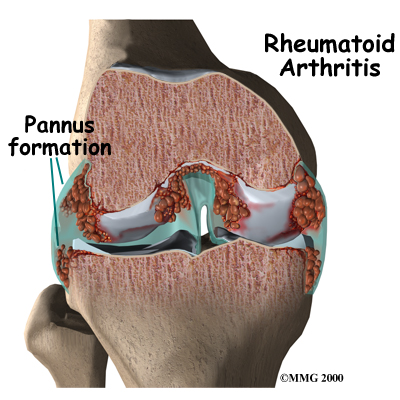What can be done for the condition?
Doctors have learned a lot about RA in recent years, but they still don't know much more about how to truly cure the disease. They do have many medical strategies for treating the symptoms of RA. This treatment includes both medication as well as physical rehabilitation. If you start treatment within a few months after your symptoms appear, you will probably do better in the long-term. Early detection and treatment can help avoid the worst joint damage. Sudden remission does occur, but it's unclear how often, and it appears to be more likely within the first two years of the disease. Patients, who develop RA at a young age, are RF positive, have close relatives with RA, and have RA nodules tend to have a more difficult time managing the disease.
Medication
Your doctor will prescribe one or more medications.
Nonsteroidal anti-inflammatory drugs (NSAIDs), such as aspirin and ibuprofen, can help decrease the pain and swelling.
Corticosteroids taken by mouth can also help with inflammation but should not be used long term if at all possible due to the other problems they can cause in your body. Corticosteroid injections into the affected joints can ease the swelling and give immediate, short-term relief. Due to eye inflammation being so common with RA and difficult to diagnose, your doctor may also prescribe eye medications, even if you have no eye symptoms. Prophylactic eye drops can help prevent symptoms from developing or becoming severe when they start.
Disease-modifying antirheumatic drugs (DMARDs) are important in treating RA. It is not certain exactly how DMARDs actually slow or prevent the structural damage from RA however, tests have shown all DMARDs to be effective.
Unfortunately, DMARDs can be very hard on the body and can interact with other drugs. Often more than one DMARD is taken at the same time and it is not always easy to find the best combination of drugs that work for each individual. Common DMARDs frequently prescribed are:
Hydroxychloroquine: A relatively nontoxic drug that was made to treat malaria. It can be safely used with other DMARDs. It is most useful in early, mild RA. Regular eye check-ups should be conducted while taking this drug.
Sulfasalazine: Much like hydroxychloroquine. This drug requires regular blood monitoring.
Gold salts: Can cause short-term remissions. Over the long-term, however, the RA does progress.
Blood and urine monitoring is required.
Methotrexate: Can help manage RA, but it is unclear how much it actually changes the course of the disease. Methotrexate can be very useful over the long-term, but there are problems with flare-ups when patients stop taking it.
Azathioprine: Used with moderate and severe RA.
Penicillamine: Only used in patients who have systemic disease that doesn't respond well to other medications.
Cyclosporine: Expensive and hard on the kidneys, so it is most often used in severe RA.
Cyclophosphamide: Very effective but very toxic, so it is only used in specific cases.
Certain antibiotics are somewhat effective in mild cases.
Biologic response modifiers (BRMs) are among the newest drugs used to treat rheumatoid arthritis.
They are genetically engineered proteins derived from human genes and are designed to inhibit specific components of the immune system that play pivotal roles in fueling inflammation, which is a central feature of rheumatoid arthritis.These agents inhibit key factors responsible for inflammatory responses in the immune system. Common biologics frequently prescribed are abatacept (Orencia), etanercept (Enbrel), infliximab (Remicade), adalimumab (Humira), and anakinra (Kineret).
Abatacept inhibits T-cell activation. T-cells are types of white blood cells that cause swelling and joint damage in patients with RA.
Etanercept, infliximab and adalimumab are tumor necrosis factor (TNF) antagonists. TNF is responsible for both joint inflammation and other systemic inflammatory responses in RA patients
Anakinra inhibits interleukin-1 (IL-1). Interleukin-1 in RA amplifies and perpetuates the inflammatory process related to the lining of the joints. This leads to the destruction of the cartilage and bones inside the joints.
Biologics are used to treat moderate to severe rheumatoid arthritis that has not responded adequately to other treatments. They differ significantly from traditional drugs used to treat rheumatoid arthritis in that they target specific components of the immune system instead of broadly affecting many areas of the immune system. Biologics may be used alone but are commonly given along with other rheumatoid arthritis medications. They have been shown to help slow progression of rheumatoid arthritis when all other treatments have failed to do so.
Abatacept (Orencia): Abatacept is given intravenously (IV) as an infusion over 30 minutes. During the first month, it is given every 2 weeks, then every 4 weeks thereafter. It may be used alone or with DMARDs.
Etanercept (Enbrel): Etanercept is taken as an injection once or twice a week. It may be used alone or with concomitant therapy such as methotrexate.
Infliximab (Remicade): Infliximab is given as a 2-hour intravenous infusion in a doctor’s office. Initially, 3 doses are given within a 6-week period; thereafter, a single dose is given every 8 weeks to maintain the drug’s effect. The interval between doses is shortened if the 8-week regimen fails to control symptoms. It is most often used with concomitant methotrexate.
Adalimumab (HUMIRA): Adalimumab is given as an injection every other week (or sometimes weekly). It is most often used with concomitant methotrexate.
 Welcome to Next Step Physio’s guide to Rheumatoid arthritis (RA).
Welcome to Next Step Physio’s guide to Rheumatoid arthritis (RA).
